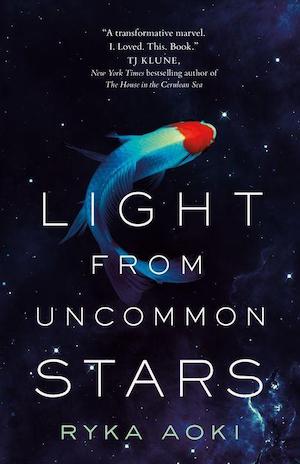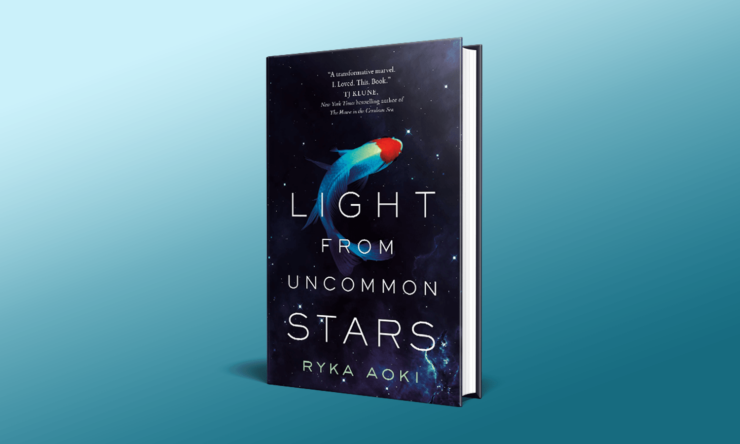Ryka Aoki’s Light from Uncommon Stars is a work of sheer, fierce wonder: defiant, wildly clever, and deeply, transformatively compassionate. Aoki masterfully blends sci-fi and fantasy to craft an innovative adventure starring trans and queer women of color, cursed violins, alien-replicated donuts, and found family.
Katrina finds herself with very few possibilities. She’s a young queer trans runaway, Chinese, Vietnamese, and Mexican, and a self-taught musician. She posts videos of herself playing the violin, which brings in a little money, and does cam work where she can too, but she doesn’t always have access to good internet, and the threat of transphobic, racist violence looms over her life. She’s running out of last resorts—until she meets Shizuka Satomi.
The world knows Shizuka as a legendary violin teacher, though she hasn’t played her own music in years. There’s a secret reason for this—Shizuka bargained with Hell for her music, and has to deliver seven souls in return. She’s at six, and time is running out. She wants this final soul to be special. Why shouldn’t she give Katrina a good life while she can? Because it is a good life: safe and fulfilling and sweet. Shizuka finds herself protective and patient with Katrina, and watches the girl blossom to her attentions. Not quite like fattening a pig to slaughter, but perhaps not entirely unlike it. At least, at first.
Everything becomes rather more complicated as Lan and her family weave their way into Shizuka’s life, and consequently Katrina’s. Lan Tran and her family run a donut shop. They’re also aliens in disguise, refugees from an intergalactic war, and they might not be able to outrun it for long—especially not the Endplague. No one outruns the Endplague. Not even for the sake of maddeningly attractive, possibly evil violin teachers. As the lives of these three women intertwine, they transform each other in subtle, surprising ways.
Buy the Book


Light From Uncommon Stars
Light from Uncommon Stars is many things. It’s a spectacular romp, full of wildly innovative writing, shifting between characters to sing a symphony of story. It’s often a joy to read, subversive and smart, full of Faustian bargains, queer courtship, and sensory evocations of food and music. It’s also often painful to read, in its unflinching depictions of transphobia and transphobic violence. Katrina is traumatized, as a young trans woman of color just trying to survive, much less play music, much less play it publicly and on the internet—and then Aoki gives her safety. Gives her protection and belonging, understanding and healing, as Shizuka learns the extent to which this world’s transphobia can be even more damning and violent than any torments Hell might have thought up. Aoki sics the Queen of Hell on anyone who would treat Katrina as anything less than she deserves, and it is deeply satisfying.
This is also some of the most brilliant, evocative writing I’ve ever read about music. I’ve always thought it’s so hard to make beautiful art out of another form of art, but Aoki does it stunningly here. What music can capture and conjure, its sheer, intoxicating power, the way it moves through memory. The way classical music is always a palimpsest, dead composers singing through our instruments, folding the past into the present and imbuing it with fresh context, every time. The myriad ways we can fail to play or fail to teach or fail to understand a song or an instrument, and the transporting magic when we get it right, when we make it our own. And also, crucially, music as it evolves—how contemporary music from anime or video games can conjure just as much of a world, and tell its listeners just as important a story.
This book reads like a set of love stories. To music, to immigrants, to immigrant food, to immigrant communities, and to trans women of color, especially at the beginning of their transition. Some of the love stories are romantic, but the others are the queer love of chosen family, and the specific experience of self-love for a trans woman of color. And it’s written lovingly, in every line. These are complicated women, and Aoki writes them with so much thoughtful tenderness. Katrina’s never done anything wrong, but so much of the world demonizes her just for who she is. Lan is trying to protect the people she loves, to be a selfless hero, while Shizuka has done perhaps some of the worst, most selfish things imaginable. But it still matters, what you do next. What it means to trust that you are deserving of care.
This is a book of refugees and immigrant families across borders and galaxies and generations. Of what we bring with us and what we leave behind, what we pass down and what we inherit. Of what we sacrifice for the ones we love, and the kind of love we deserve. Of how we can change and save each other.
Light from Uncommon Stars is a fresh, fiercely fun story, ambitious, triumphant and brimming with heart. One of the best speculative novels I’ve ever read, this is one of those books that reminds me what genre is capable of. It feels like a galaxy in and of itself, whirling and full of terror and magic and the strange, wondrous mechanics of the universe. This novel is an atmospheric balancing act, and Aoki enacts it dazzlingly. There’s deliberate heartache and intensity here, but it’s written with profound catharsis, forgiveness when it’s due, and so, so much hope.
Light From Uncommon Stars is available from Tor Books.
Read a series of excerpts from the novel, starting here.
Maya Gittelman is a queer Pilipinx-Jewish diaspora writer and poet. Their cultural criticism has been published on The Body is Not An Apology and The Dot and Line. Formerly the events and special projects manager at a Manhattan branch of Barnes & Noble, she now works in independent publishing, and is currently at work on a novel.










